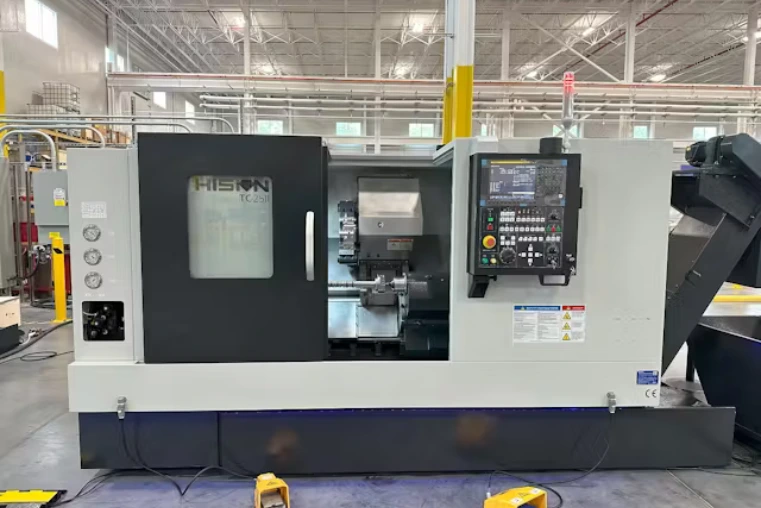Everything You Need to Know About CNC Machines: A Complete Guide
Jul 25, 2025
CNC (Computer Numerical Control) machining is a cutting-edge manufacturing process that has revolutionized industries worldwide. It’s known for offering precision, repeatability, and speed in producing complex parts. In this guide, we will explain the basics of CNC machining, the types of machines involved, their benefits, applications where CNC technology is used.
What is CNC Machining?
CNC machining is a method of controlling machine tools using a computer program. Unlike traditional machining, where operators manually control the machine, CNC machines are automated. The computer directs the movement of cutting tools and material to produce precise parts with great accuracy. CNC machining can handle a variety of operations like milling, turning, drilling, and grinding.
Steps Involved in CNC Machining
The CNC machining process typically follows these steps:
Designing the Part: First, a digital design is created using CAD (Computer-Aided Design) software. This design includes all the specific dimensions and requirements for the part.
Programming the Machine: From the design, a CNC program is generated using CAM (Computer-Aided Manufacturing) software. This program guides the CNC machine.
Machine Setup: The CNC machine is set up, including installing the necessary cutting tools and securing the material.
Machining Process: The machine follows the program, moving the cutting tool and material in specific directions to create the part.
Inspection and Finishing: After machining, the part is inspected for accuracy and quality. If needed, additional finishing steps are taken to refine the surface or dimensions.
Types of CNC Machines
CNC machines come in various forms, depending on the type of operation they perform. Here are some of the most common types:
CNC Milling Machines
CNC Milling is a process where rotating tools are used to cut or carve parts from a piece of material. The material remains stationary while the tool moves to shape it, which is perfect for creating complex, intricate parts with high precision.
Vertical Machining Centers (VMC): These machines have a vertically positioned spindle and are excellent for complex, 3D parts. Available in 3, 4, and 5-axis versions for increased versatility.
Horizontal Machining Centers (HMC): These machines are ideal for high-volume production. They are faster and can machine multiple parts simultaneously, making them suitable for large-scale operations.
Double Column Milling Machine (DCMC): Double column milling machines are heavy-duty machines designed for high-precision and large parts machining. With a rigid structure, they offer enhanced stability and accuracy when dealing with larger, heavier workpieces.
CNC Lathes
CNC lathes are machines where the workpiece rotates while a stationary cutting tool shapes it. They are commonly used for creating round or cylindrical parts such as shafts, bushings, and rings. Depending on the complexity and scale of the task, various lathe configurations may be used—ranging from general-purpose machines to more specialized setups.
Common Materials Used in CNC Machining
CNC machines can work with a wide range of materials, each offering unique characteristics. Some of the most common materials include:
Ferrous Metals:
Carbon Steel: Strong and versatile, suitable for mechanical components.
Stainless Steel: Known for its resistance to corrosion, commonly used in food and medical industries.
Cast Iron: Heavy and durable, used for parts like engine blocks.
Non-ferrous Metals:
Aluminum: Lightweight and easy to machine, perfect for aerospace and automotive.
Copper: Excellent electrical conductivity, used in electrical applications.
Titanium: Strong, corrosion-resistant, and often used in aerospace and medical fields.
Plastics:
Polycarbonate: Strong and impact-resistant, used for housings and lenses.
Acrylic: Clear and easy to machine, perfect for decorative and functional applications.
Nylon: Durable and abrasion-resistant, commonly used for gears and parts in machines.
Composites:
Carbon Fiber: Lightweight and strong, used in aerospace and automotive.
Fiberglass: Used in construction and consumer products due to its lightness and strength.
Benefits of CNC Machining
CNC machining offers numerous advantages for manufacturers:
High Precision: CNC machines can create parts with tight tolerances, ensuring high-quality components.
Repeatability: Once programmed, a CNC machine can reproduce the same part consistently, making it ideal for mass production.
Efficiency: CNC machines can work continuously, reducing production time and labor costs.
Flexibility: CNC machines can be adapted to create a wide range of parts from different materials.
Error Reduction: Automated programming reduces human errors, ensuring greater accuracy.
Applications of CNC Machining
CNC machining is used across various industries for producing parts that require precision and durability. Some key industries include:
Aerospace: Parts like turbines, brackets, and engine components.
Automotive: Components such as axles, engine blocks, and gears.
Medical: Surgical tools, implants, and medical devices.
Electronics: Housings and internal components for electronic devices.
Construction: Structural parts for machinery and equipment.
Choosing the Right CNC Machine for Your Business
When selecting a CNC machine, keep these factors in mind:
Application Needs: Choose a machine suited for the type of parts you produce, whether for milling, turning, or complex shapes.
Machine Capabilities: Ensure the machine can handle your materials and desired part sizes. Consider speed, power, and multi-axis capabilities.
Technology & Software: Opt for machines with advanced control systems and software integration for efficiency.
Maintenance & Support: Choose a supplier that offers reliable maintenance and customer support.
Budget & Quality: Balance quality with cost by considering long-term efficiency and durability.
At Petrotek, we provide high-quality CNC machines tailored to your specific needs. In addition to helping you find the perfect equipment for your business, we also offer complete installation and ongoing technical support to ensure smooth operation and long-term reliability.
Email: lubeinfo@petrotek.de

